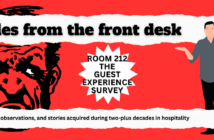Tips for selecting the right workwear for hospitality businesses
by NICK WARRICK
Choosing the right workwear may seem like a simple task. However, the hospitality industry requires several critical considerations to think about while assembling on-the-job wardrobes. Here are some helpful tips for picking the right workwear.
 1. SAFETY FIRST
1. SAFETY FIRST
What’s more important than aesthetics or branding goals with hospitality workwear? Safety should be the top concern, which is why it’s first on this list. Today, there’s a much stronger push for hospitality businesses to develop and implement a workplace safety culture. This includes addressing every area of the business to improve safety outcomes, and workwear is a critical consideration in many hospitality businesses.
For example, many cooks and chefs are exposed to hot ovens, boiling oil, or even open flames. Because of heat-related hazards, the Occupational Safety and Health Administration (OSHA) recommends providing these employees with protective clothing that’s resistant to grease and heat up to 400 degrees Fahrenheit. Another example is workers who are exposed to cold. They can benefit from jackets, gloves, or other protective gear. While safety clothing and accessories can be customized to fit a company’s brand, their primary function should be to protect workers.
2. FUNCTION AND PRACTICALITY
One of the most important parts of selecting or designing a uniform is choosing pieces that are both suitable and useful to the people wearing them. If you’re having a hard time choosing between different styles, try to prioritize usefulness above cost. Never underestimate the value of functional clothing. For example, smaller aprons may have fewer or shallower pockets and may cost less, but the serving staff may find deeper pockets or extra pockets to be useful. They may not need to take as many trips to a stockroom or may be able to work more efficiently, which means the more-expensive aprons are more economical in this scenario.
The material, stretch, and design of workwear are important to consider as well. Workers should have comfortable workwear for their roles and the atmosphere. For instance, hotel workers may benefit from shirts with short sleeves in the summer and long sleeves in the winter. Cleaning staff may benefit from lighter uniforms that have some stretch since they bend and move a lot. These are just a few examples. To better understand the needs and preferences of staff, ask them for feedback about what they prefer to wear while performing their duties.
3. CONSIDER YOUR CUSTOMERS
While some hospitality businesses cater to people of all ages, others attract people from a specific age group. Think about your customers and the surrounding area. For example, a restaurant in an upscale building downtown may attract professionals who eat there after work. They may prefer to see simple and classy white uniforms or neutral colors. However, a restaurant by the beach in an area that attracts mostly younger people or tourists may decide on uniforms that reflect the beachy atmosphere and have brighter colors.
With these tips, you’re well on your way to choosing workwear that benefits your company, your workers, your customers, and the environment.
4. CONSIDER YOUR BRANDING STRATEGY
Do you already have a strong brand? If so, this task may be easier for you. Choosing brandable workwear with the colors or styles that reflect your brand is a must. If you’re just starting a business in the hospitality industry, work on creating your brand strategy before you choose uniforms. The brand should reflect your mission, values, and image. Also, connecting workwear to your brand’s voice or personality is important. For instance, think of a boutique hotel that has a fun, energetic atmosphere. The business would plan to use a similar style of voice for its website and marketing materials. Because of this, it makes sense for that hotel to have staff uniforms that are fun and bright as well.
Every part of your business should reflect your brand in some way. If you leave out branding in any element of your hospitality business, it’s harder to build trust, and trust is connected to perceptions of competence. Choosing the right brandable workwear for your staff is more than just making sure the garments coordinate with your company’s theme or image. It’s also part of strengthening your reputation, making your customers feel more comfortable, and maintaining consistency in branding.
Employees also should feel connected to your brand and have a positive image of it. One way to make them feel valued and connected is to personalize their workwear with their names. Using custom embroidery is an excellent way to show employees you care enough about them to put their names on uniforms instead of making them wear removable nametags.
5. CONSIDER QUALITY AND DURABILITY
In addition to style, color, safety, and functionality, durability is crucial. Specifically, a uniform should be durable for the tasks the employee needs to perform in it. For example, stain-resistant materials are ideal for cleaning or maintenance staff. The stitching, embroidery, pattern, and other components should be designed well for the garment to be durable.
Depending on your company’s policies, employees may be issued two or more uniforms to wear. The uniforms should be easy to care for and made of sturdy materials. When you buy quality workwear that’s designed to last, you won’t have to spend as much money on uniforms on a long-term basis. Also, make sure employees know how to properly care for their uniforms. Some businesses also offer complimentary uniform laundering or cleaning for some types of uniforms, which is beneficial to both the employee and the company. The employee doesn’t have to spend time cleaning the uniform or spend money on it. The company benefits, too, since there is the assurance that the uniform will be cleaned or laundered properly.
Finally, another important, and timely, consideration in ordering hospitality workwear is sustainability. When you choose high-quality clothing that lasts longer, there’s less environmental waste as well.
With these tips, you’re well on your way to choosing workwear that benefits your company, your workers, your customers, and the environment.
Nick Warrick is the sales manager at All Seasons Uniforms, a professional workwear company based outside of Chicago that has been in business since 1991.




